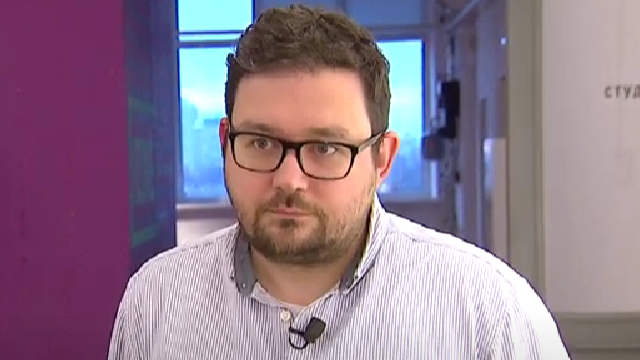
In June 2014, the Izolyatsia Foundation was seized by armed representatives of the so-called DPR. People broke into the territory with documents on the change of ownership and said that the premises would allegedly be given for storage of Russian humanitarian aid.
People from the team were threatened – they were on the list of those who were planning to put & # 8220; in the basement & # 8221; , and therefore the foundation had to urgently flee from their hometown.
About how the art space moved from the factory in 2014, how the artists were worried that they would end up in dungeons and much more ICTV facts asked the director of development of the Izolyatsia Foundation and the creative community of IZONE – Mikhail Gluboky .
– When did Izolyatsia move from Donbass?
– We moved in 2014. In fact, in June 2014, the premises of Isolation were seized by militants and turned into a concentration camp. We had to flee immediately. That is, people from our team were on the lists of those who need to be caught and put & # 8220; in the basement & # 8221; … Nobody wanted to risk it. Therefore, we immediately left and started working in Kiev.
– Someone from your team still got & # 8220; to the basement & # 8221; Or did everyone manage to leave?
– On the first day, when this seizure took place, they were detained and kept there, inside. We had no connection with them. It was scary. But, fortunately, they were released. After that, everyone immediately left, and therefore no one was captured.
– The people who captured you were local, or is it & # 8220; alien & # 8221 ;?
– The person who communicated directly with us is Roman Lyagin, who is now in Kiev and is going through the courts. He, of course, is from Donetsk.
He is the person who came to us with papers stating that the premises belong to them. One side. And on the other hand, then he became a minister of something there, then he led this so-called referendum in Donetsk. That is, a person of a wide profile.
– In June 2014, he came to us with a paper of the so-called DPR, where it was written that they would use this room for storing Russian humanitarian aid . But later, already the people who took control of this territory – and this coincides with the information of the people who passed through Izolyatsia – said that there were inside there were Russian career officers, the FSB and so on.
– Do you think you can return home later or not?
– We really hope so. I think we will be back. Another question is when, and another question is what to do with this space. We talk about this very often, journalists ask us.
In 2014, naturally, we said: yes, we'll be back tomorrow. Of course now it looks more complicated and hazy. But, in reality, we have come up with a plan for ourselves what we want to do with this territory when we return.
– We made a plan for a large memorial park. The idea is that we want to demolish everything on the territory and build a large memorial park there in honor of those victims who went through this concentration camp and in general through this war.
– Could Isolation somehow influence the fact that Ukraine heard the voice of Donbass?
– Oh sure. First of all, it was very important for us to say that there is no one voice of Donbass … That there are many different people, they have many different thoughts. In fact, this is such a propaganda cliché. And we tried to convey all these voices not only to all of Ukraine, but to the whole world.
For example, in 2014, when there were actually hostilities, when the center of Donetsk was seized, we did in Donetsk, in Izolyatsia, a specially large literary festival, where we invited people from all over Ukraine and journalists from all over Ukraine – including people from Donetsk and Crimea. And also people from abroad. So that, in fact, people can communicate and understand.
Because the all-Ukrainian media showed these militants that the city center was captured. A picture appeared that it was all the residents of Donbass who had joined the Russian occupation campaign.
– But in reality it was not true, and it was important for us to show it. That there are many young people who look to the West, who know and understand what is happening in Ukraine. And all this time we continue to talk about it.
And now, when we are back to the east (to Soledar, a city in the Bakhmut district of Donetsk region – Ed. ) and we are working with small towns.
This whole idea of cultural decentralization is very important for us, because we give voice to people and small organizations. Because before that, for the most part, one could hear the big cities and institutions that exist there.
But thanks to the decentralization process that has now taken place in Ukraine, there are many funds and opportunities for just such people and organizations.
And we want to provide them with more support for development.

